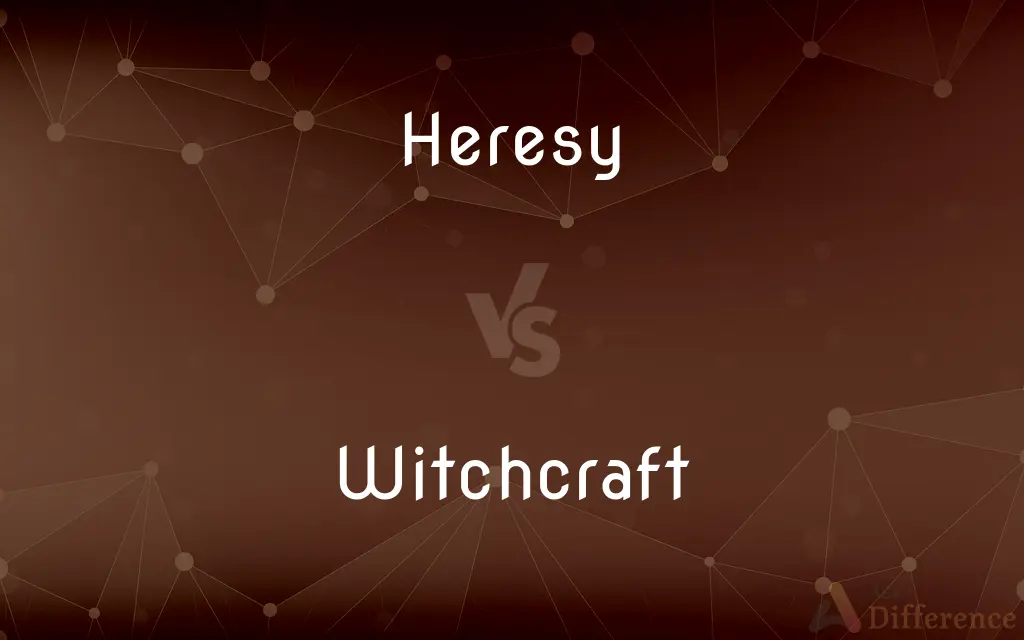Heresy vs. Witchcraft — What's the Difference?

Difference Between Heresy and Witchcraft
ADVERTISEMENT
Compare with Definitions
Heresy
Heresy is any belief or theory that is strongly at variance with established beliefs or customs, in particular the accepted beliefs of a church or religious organization. The term is usually used in reference to violations of important religious teachings, but is also used of views strongly opposed to any generally accepted ideas.
Witchcraft
Witchcraft is the practice of what the practitioner ("witch") believes to be supernatural skills and abilities, such as the casting of spells and the performance of magical rituals. Witchcraft is a broad term that varies culturally and societally, and thus can be difficult to define with precision.
Heresy
Belief or opinion contrary to orthodox religious (especially Christian) doctrine
Huss was burned for heresy
The doctrine was denounced as a heresy by the Pope
Witchcraft
Magic; sorcery.
Heresy
An opinion or a doctrine at variance with established religious beliefs, especially dissension from or denial of Roman Catholic dogma by a professed believer or baptized church member.
ADVERTISEMENT
Witchcraft
Wicca.
Heresy
Adherence to such dissenting opinion or doctrine.
Witchcraft
A magical or irresistible influence, attraction, or charm.
Heresy
A controversial or unorthodox opinion or doctrine, as in politics, philosophy, or science.
Witchcraft
The practice of witches; magic, sorcery, or the use of supernatural powers to influence or predict events.
Wiccans believe in a modernised form of witchcraft.
Heresy
Adherence to such controversial or unorthodox opinion.
Witchcraft
Something, such as an advanced technology, that seems almost magical.
Heresy
(religion) a doctrine held by a member of a religion at variance with established religious beliefs
Witchcraft
The practices or art of witches.
Heresy
A controversial or unorthodox opinion held by a member of a group, as in politics, philosophy or science.
Witchcraft
Sorcery; enchantments; intercourse with evil spirits.
Heresy
An opinion held in opposition to the established or commonly received doctrine, and tending to promote a division or party, as in politics, literature, philosophy, etc.; - usually, but not necessarily, said in reproach.
New opinionsDivers and dangerous, which are heresies,And, not reformed, may prove pernicious.
After the study of philosophy began in Greece, and the philosophers, disagreeing amongst themselves, had started many questions . . . because every man took what opinion he pleased, each several opinion was called a heresy; which signified no more than a private opinion, without reference to truth or falsehood.
Witchcraft
Power more than natural; irresistible influence.
He hath a witchcraftOver the king in 's tongue.
Heresy
Religious opinion opposed to the authorized doctrinal standards of any particular church, especially when tending to promote schism or separation; lack of orthodox or sound belief; rejection of, or erroneous belief in regard to, some fundamental religious doctrine or truth; heterodoxy.
Doubts 'mongst divines, and difference of texts,From whence arise diversity of sects,And hateful heresies by God abhor'd.
Deluded people! that do not consider that the greatest heresy in the world is a wicked life.
Witchcraft
Adherence to or the practice of Wicca. In this sense the term does not necessarily include attempts at practice of magic, other than by prayers to the deities.
Heresy
An offense against Christianity, consisting in a denial of some essential doctrine, which denial is publicly avowed, and obstinately maintained.
A second offense is that of heresy, which consists not in a total denial of Christianity, but of some its essential doctrines, publicly and obstinately avowed.
Witchcraft
The art of sorcery
Heresy
Any opinions or doctrines at variance with the official or orthodox position
Heresy
A belief that rejects the orthodox tenets of a religion
Share Your Discovery

Previous Comparison
Should vs. May
Next Comparison
Galluses vs. Suspenders














































